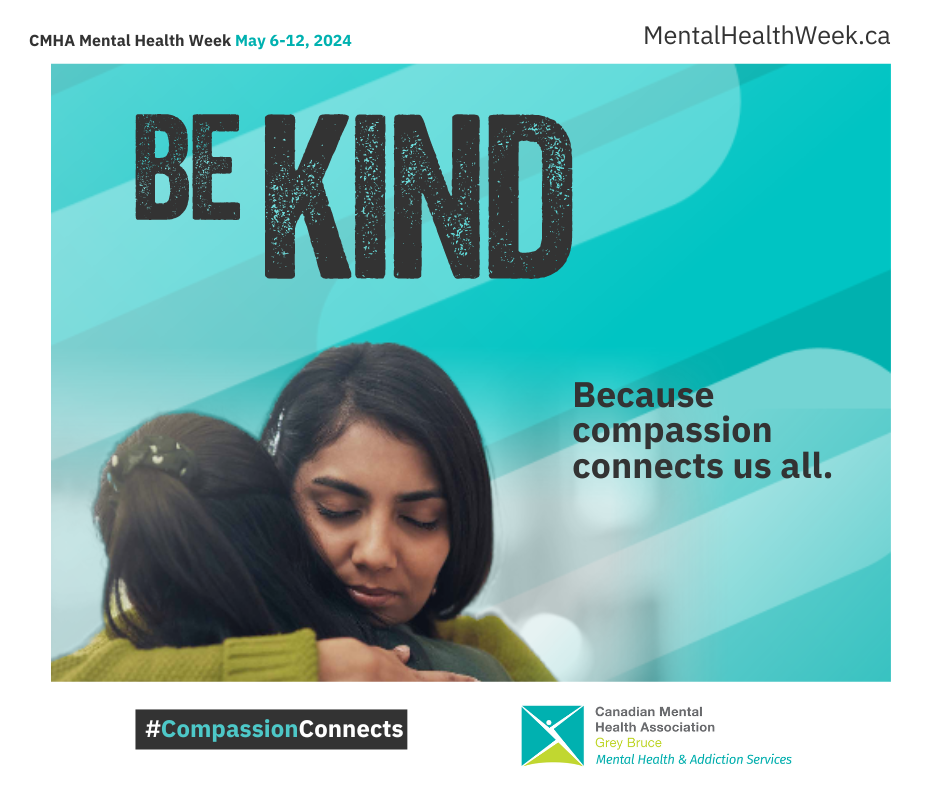Menu
Close

While Most Canadians Claim Compassion, Many Struggle to Turn Compassionate Intentions into Action—CMHA Sheds Light During Mental Health Week
May 6, 2024
Despite almost all (92%) Canadians claiming to be compassionate, less than four-in-10 (38%) acted in the past year to alleviate hardship.
CMHA releases new data on compassion for Mental Health Week
Owen Sound, (Ontario), May 6, 2024 – Canadians are often recognized globally for their compassion and kindness; however, new data may suggest otherwise. A recent study by the Canadian Mental Health Association (CMHA) found that while 92% of Canadians claim to be compassionate, only 38% have taken active steps to alleviate hardship in the past year.
Compassion, defined as the practice of meeting suffering – whether our own or that of others – with kindness,[1]is often confused with empathy. While empathy involves sensing, feeling, and understanding of another’s experience, compassion goes beyond empathy into the realm of taking action.
“Compassion is the emotional response to the struggles of others combined with a real, authentic desire to help lessen their suffering and respond with care,” says Margaret Eaton, National CEO, CMHA. “With so much hardship going on in the world, compassion is needed now more than ever.”
The survey conducted by Maru Public Opinion found that while more than three quarters (76%) of Canadians feel compelled to get involved and help when someone is struggling, less than 4-in-10 (38%) took action over the last year. Half (48%) say they just don’t have the time or resources given everything else going on in their life.
“We’re seeing a lot of people wanting to be more compassionate, but not knowing how. The good news is that compassion is part of our human nature and can be learned and practiced,” explains Eaton. “In fact, giving compassion, receiving compassion, and allowing ourselves to experience self-compassion are all very beneficial to our mental health.”
Demonstrating compassion through caring actions and kindness can positively impact mood and help alleviate feelings of depression.[2] This is because the act of “giving compassion” is closely connected to the release of oxytocin, a feel-good hormone. Research also suggests that compassion is contagious.[3] Experiencing acts of compassion can encourage people to show compassion too, creating a domino effect.
“This Mental Health Week, we also recognize the acts of compassion our community mental health workers across the country offer day in, day out – providing services like mobile mental health crisis response, harm reduction services, housing, and so much more to millions of Canadians,” continues Eaton.
Practicing compassion is fundamental to creating a more just and equitable society. It helps to establish trust, strengthen relationships, and cultivate a sense of community. In fact, 78% of Canadians think Canada could be a more compassionate country by doing more to help those in need through social support programs and better laws/policies.
“At CMHA Grey Bruce, our commitment to compassion is central to everything we do, deeply embedded in our Values statement alongside dignity, inclusivity, integrity, and choice. We view compassion as essential for creating a supportive, understanding community where every individual feels valued and connected.” – Stephen Musehl, CEO, CMHA Grey Bruce
The release of this data coincides with CMHA’s 73rd Mental Health Week (May 6-12). This year’s theme “Healing through Compassion” explores how compassion connects us all. To learn more and get involved, visit www.mentalhealthweek.ca.
-30-
For more information, contact:
Don Vail – Communications and Fund Development Manager
Canadian Mental Health Association Grey Bruce
519-371-3642 | 1-888-451-CMHA (2642) ext.1018
About Canadian Mental Health Association, Grey Bruce
At CMHA Grey Bruce Mental Health and Addiction Services we cultivate hope, resilience, and community for those who live with, and are impacted by, mental illness and/or/addiction. We will create an inclusive community inspiring hope, choice, and wellbeing for all. We are driven by our values of compassion, dignity, inclusivity, integrity, and choice. For more information, visit www.greybruce.cmha.org
About the Survey
This Maru Public Opinion study commissioned by the Canadian Mental Health Association is from a survey conducted April 4-5, 2024, among a random selection of 1,507 Canadian adults who are Maru Voice Canada online panelists. The results have been weighted by education, age, gender, and region (and, in Quebec, language) to match the population according to Census data which ensures the sample is representative of the entire adult population of Canada. For comparison purposes, a probability sample of this size has an estimated margin of error (which measures sampling variability) of +/- 2.5%, 19 times out of 20.
[1] Neff, K. (2020, July 9). What is self-compassion?. Self-compassion. https://self-compassion.org/the-three-elements-of-self-compassion-2/
[2] Leaviss J, Uttley L. Psychotherapeutic benefits of compassion-focused therapy: an early systematic review. Psychological Medicine. 2015;45(5):927-945. doi:10.1017/S0033291714002141
[3] https://www.newportacademy.com/resources/well-being/compassion-benefits
